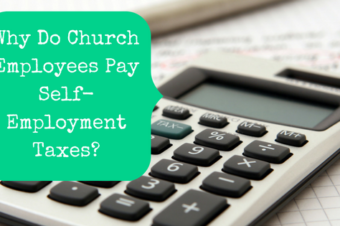
A recent court case helped to clarify when pastoral gifts are considered taxable income. Make sure you know how to classify your income to avoid owing penalties and back taxes.
Here in the US, we operate under what is called common law. That means that not all of our laws are written down like the ten commandments. There are some rules that are legally binding not because they were written down and legislated, but because of a judge’s decision in a prior court case.
It’s called precedent. One judge decides a case in a certain way, so all future judges copy him. It becomes law. Sometimes it doesn’t completely become law, but the precedent is used as a very persuasive argument for judges to continue to rule in the same way.
(Quick trivia: Which is the only state that doesn’t practice common law? Louisiana! Their legal system is modeled after French civil law, not English common law like the rest of ours.)
Why does this matter? Because even if our legislators aren’t getting anything done, law is being created in courtrooms all across the nation. Including tax law. Tax law that applies to ministers.
The “Blue Envelope” Case
A court case was recently decided that has implications for ministers everywhere. Here is the general story:
A pastor starts a church. He decides not to take a salary but lets the church members know that there will be blue envelopes that can be used to give him a gift, or love offering. The blue envelopes will go directly to him as a gift, and not the church, so they will not be tax deductible.
His people like him. They give him gifts. Since he is living off of gifts and not a salary, he does not file a tax return.
Enter the IRS. They say the money from the blue envelopes is income and he owes taxes on it. He says it was a gift and is therefore not taxable. They go to court to duke it out.
How The IRS Determines A Gift Versus Taxable Income
In the end, the judge ruled in favor of the IRS. He based his decision on these four factors:
1. The donations were objectively provided in exchange for services.
Basically, the judge believed that the congregation gave the pastor money because they liked what he did for them and wanted him to stay (and keep doing it). If he had been retiring and they gave him a gift, that would have been treated differently because he wouldn’t be providing them with any further services. However, the court document stated, “We do therefore find that by this measure the contributions made in blue envelopes were not gifts as that term has developed in tax law, but are rather—from an objective perspective—meant to keep [the pastor] preaching where he is.”
2. The pastor specifically solicited the payments.
The pastor informed the congregation of the blue envelopes for gifts at a church business meeting. Because he was the one that asked for it, it didn’t look as much like a gift in the judge’s eyes.
3. The money was given as a part of a routinized and structured program by the whole church, not just select people.
One of my pet peeves is “suggested donations,” as in we are having a free event but the suggested donation is $5 at the door. I think “expected” would be more appropriate than “suggested.”
It seems the tax court feels the same way. This case wasn’t about a $50 bill someone randomly handed the pastor after a particularly moving sermon. It was a structured system of regular payments. The fact that payments totaled over $200,000 in 2008 and 2009 and there was less than a 10% change between those two years made the IRS suspicious. The judge wrote, “These are regular, sizable payments made by people that [the pastor] provides a service for, and they are therefore hard to distinguish from compensation.”
4. The donations far exceeded the pastor’s salary.
In addition to the blue envelope gifts, the pastor took a housing allowance of $6,500 a month. Because the gifts were his main source of income instead of a stated salary, the court ruled that it essentially was his salary. Which should be taxable.
The final conclusion was, “When comparatively so much money flows to a person from people for whom he provides services (even intangible ones), and to whom he expects to provide services in the future, we find it to be income and not gifts.” And what the IRS deems income, they collect taxes on.
How Does This Affect You?
You may be thinking, interesting story, but why do I care? You should care because you are a pastor. And you receive gifts. And the IRS could audit you just as easily as they did the blue envelope pastor.
It is important for you to understand how your different sources of income are taxed and why. You can follow that link to learn more. You also need to make sure that your tax preparer is well-versed in all of the nuances of ministerial taxes. Because it is so unique, it is an area where most tax preparers are ignorant and make mistakes.
The blue envelope pastor didn’t only have to pay years of back taxes, he had to pay penalties too. I wouldn’t wish that on anyone. Please, pay attention to your taxes and make sure the people you work with know what they’re doing. You won’t regret it.
You can read all of the details of the court case mentioned above here.




1 Response